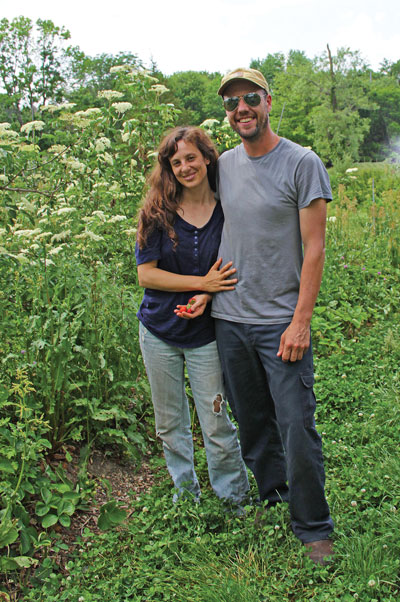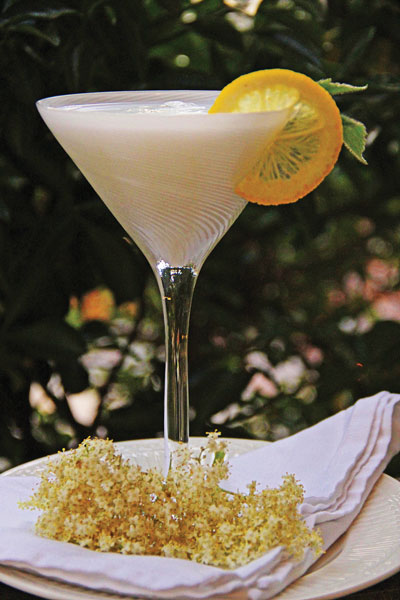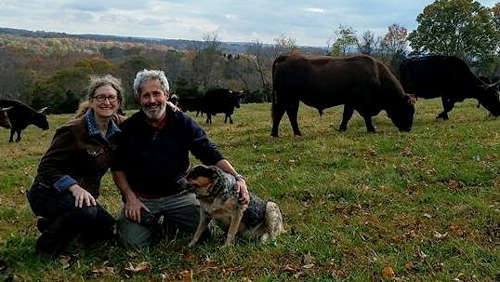Co-owners and operators Johann Rinkens and Lindsay Napolitano are passionate about revitalizing the natural landscape of their one-of-a-kind certified organic farm, Fields Without Fences. Now in its third growing season, the farm was abandoned and dilapidated before Rinkens and Napolitano arrived.

“This was a deteriorated landscape generally inhospitable to most forms of agriculture,” explains Napolitano. “The Delaware watershed has been historically farmed for more than 200 years. There has been a tremendous amount of soil erosion and the severely compacted clay subsoil is nearly impossible to till.”
Looking out over the bucolic ten-acre field, where magnificent, feathery elder bushes are in full alabaster bloom, it’s nearly impossible to believe this land was unusable such a short time ago. A closer look reveals ruby ripe strawberries, brilliant red clover, and the delicate buds of chive, chervil, thyme and sage going to blossom in the intermingled beds.
“We’re using ecosystem mimicry to move the land back into a close model of a native New Jersey forest,” explains Rinkens. “There is a long tradition of indigenous land management, or what we call forest gardening, in the American continents. Experts are finding more and more evidence that this is how people traditionally managed forest landscapes.”
Using the native succession pattern in this model, Fields Without Fences seeks a delicate balance between letting nature take its course and agricultural production. “We have a perennial system,” says Napolitano. “A mixed orchard featuring native fruit such as paw paw, persimmon, elderberry, and blackberry. In the ground layer we grow culinary and medicinal herbs, as well as edible flowers. It’s a diversified system in that everything is interplanted.”
Fields Without Fences sells seasonal edible flowers, culinary herbs, specialty vegetables and fruit to a local distributor. These go to high-end restaurants and retail sellers. “We have two different flower product lines,” says Rinkens. “Edible herb flowers such as thyme, sage, and chervil; and wild, edible flowers—a mix of meadow blossoms such as violets, calendula, elder flowers, and black locust. Retail consumption is limited, but chefs use these uncommon flowers for hints of unique flavors and interesting nuances.”
Additionally, Rinkens and Napolitano participate in topical public lectures and conduct at least one forest garden workshop each year, as well as occasional workshops on medicinal herbs and water management. They also provide offsite consulting and for landscape restoration and design.
This year, Fields Without Fences introduced a medicinal herb CSA (Community Supported Agriculture) featuring dried medicinal herbs, flowers and plants grown on site and processed into numerous tinctures, tea blends, tonics and such. Seasonal shares include educational materials – the spring focus was on allergies, spring cleaning and detoxing. The summer share will concentrate on cooling herbs, sunscreens and remedies for insect bites.
“Flowers play a wonderful and critical role in establishing the ecosystem,” says Napolitano. “Yes,” Rinkens agrees. “We encourage pollinators and use no pesticides of any type. The abundance of flowers has a tendency to draw in pollinators so we see a lot of native bees, wasps and hornets.”
“Don’t go barefoot,” advises Lindsay. “When the clover is in bloom, the ground is just buzzing.”

Lindsay Napolitano chose to highlight elderflower, her favorite blossom and the signature plant of Fields Without Fences. Its lush white blooms peak in late May and early June. Elderflower has a unique, deep and aromatic flavor and aroma, lending itself well to sipping cordials. Pick the flowers in full bloom, then infuse in a simple syrup. Mix with a splash of sparkling water, champagne or vodka for a refreshing drink.
To make syrup, pour sugar into a small heavy saucepan. Stir in water and mix well. Place over medium-high to high heat and bring to a boil, stirring frequently. Turn down heat, and simmer for 2 to 3 minutes until sauce is thickened. Remove from heat. Add elderflower blossoms and lemon slices. Cover, and let steep overnight (at least 12 hours).
Strain syrup, and pour into clean glass jars. Store in the refrigerator for up to 6 weeks.
When ready to serve, add a splash of elderflower syrup to a tall glass, then fill with sparkling water, champagne or vodka for a flavorful Elderflower Cordial.
Makes about 6 cups of elderflower syrup.
Fields Without Fences
73 Barbertown Idell Rd., Frenchtown 908/996-0525
Educate yourself about edible plants before ingesting any flowers.

Artisanal cheeses, wood fired breads, 100% grass-fed beef, whey fed pork, and suckled veal, 100% grass-fed ice cream, pasta made with Emmer wheat and our own free-range eggs, and pesto made with our own basil! Bread and cheesemaking workshops are held on the working farm as well as weekend tours and occasional concerts.

Delightful fantasies beyond words! Gold, Platinum & Silver Jewelry, Wildlife Photos, Crystal, Lighthouses. Perfume Bottles, Santas, Witches Balls, Oil Lamps, Paperweights, Chimes, Art Glass, Wishing Stars. Also offering jewelry and watch repair